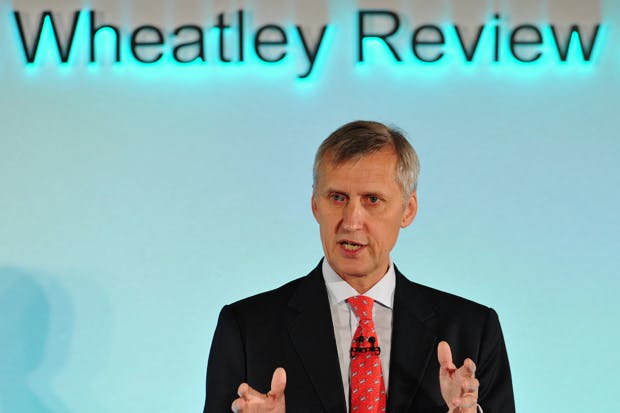A City insider at last month’s Mansion House dinner told me the Financial Conduct Authority had become ‘a bit of an embarrassment’ — or rather, that was my bowdlerisation of what he actually whispered. So it comes as no surprise that FCA chief executive Martin Wheatley has resigned, having been told by the Chancellor that his contract would not be renewed. A former London Stock Exchange director and Hong Kong securities regulator, Wheatley has a knack of making enemies: Hong Kong investors, unhappy with his handling of alleged misselling of Lehman Brothers ‘minibonds’, once burned a funeral effigy of him outside his office.
London bankers didn’t quite go that far, but resented his stroppiness and the fact that he had never been a practitioner in their sector. Bank of England and Treasury officials seem to have found him an uncomfortable (not to mention gaffe-prone) colleague — a reminder of their earlier dysfunctional relationship with the Financial Services Authority, from which the FCA descends. And consumers failed to give him due credit for his efforts to protect them, notably by clamping down on payday lending.
Osborne’s ‘new settlement’ for the City, also unveiled at the Mansion House, seems to imply less Wheatley-style persecution of bankers as a tribe so long as they abide by proper codes of conduct and their leaders accept personal responsibility when things go wrong on their watch. There’s also a suggestion that ‘ring-fencing’, separating retail from high-risk trading, might be softened as a reward for better behaviour.
But in reality this new mood of ‘engagement’ is likely to last only until the next scandal. The new corporation tax surcharge on UK bank profits — hitting building societies and challenger banks as hard as big City targets — is an indication that the Chancellor will go on treating the sector as a Punch-and-Judy show when it suits. If the ousting of Wheatley really is ‘a reward to the bankers for backing the Tories’, as widely claimed in website postings, it’s a modest sop by comparison with a £1.6 billion tax-grab. I suspect the real need for ‘different leadership’ at the FCA was much more to do with personality than political positioning; in any case, Wheatley’s interim successor, the former FCA head of enforcement Tracey McDermott, has the reputation of an even more ardent banker-basher than he was.
Is BT too big?
Would consumers be the winners if BT were forced by Ofcom to sell off Openreach — the network through which Sky and TalkTalk, as well as BT itself, provide broadband and home phone services? This is the most radical of several options being considered by the regulator as part of a strategic review, and naturally BT boss Gavin Patterson says even debating such a split would be ‘a mistake for the country as a whole’, since it would deter BT from investing in superfast broadband coverage — which he argues is best achieved by a company capable of operating at very large scale with a very long time-horizon.
Sky, which resents BT’s recent incursion into sports television, naturally retorts that BT needs shaking up because its competitive position is unfair and its broadband service is below par. Consumers — including businesses for whom reliable internet links are as essential as uninterrupted electricity — naturally prefer choice over semi-monopolies, but put the highest priority on continuity of supply. And industry-watchers, including our own Matthew Lynn, are natural sceptics of the fashionable ‘quad play’ in telecoms: the urge to sell mobile and fixed-line services along with broadband and pay-TV all in a bundle, which was the rationale for BT’s acquisition of mobile network EE — also now under scrutiny from Ofcom.
The risk that Britain will fall behind in broadband provision — a key factor for business investment and productivity — is such that the regulator would certainly be wise to make sure that other players such as Virgin Media were building networks that could compete with Openreach before taking an axe to BT. But all this is a reminder that only in big-company boardrooms is corporate bigness itself considered a virtue.
Messages in metal?
Interesting times in metal commodity markets. The price of copper hit a six-year low of $5,245 per tonne last week, while gold fell to $1,088 per troy ounce on Monday, its lowest level since March 2010. The gold fall might be taken as an indication of growing confidence in the global economy; even the Greek crisis has failed to spark renewed enthusiasm for precious metals as a safe haven. Meanwhile, falling copper usually reflects a slowdown in Chinese industrial demand — a negative for global growth. If these trends seem inconsistent, the answer may be that both metals have been subject to speculative plays by Chinese investors seeking to recoup recent losses on the Shanghai stock market — so the price swings may not be telling us anything useful at all.
Pontrevexit avoided
In Yorkshire, our splendid Ryedale music festival is in full swing. The highlight so far is The Merry Widow in a topical translation by John Warrack. ‘The Germans are fed up with us, we’ll never get another bailout,’ says the ambassador of Pontrevedro: banker’s widow Hanna must marry a Pontevedrian so that her fortune stays in the country, ‘or we’ll be bankrupt and we might be thrown out of Europe’. Franz Lehár wrote this charming piece in 1905, when the Austro-Hungarian currency union held sway from Poland to Romania. It fell apart — as currency unions do — in 1919. But Lehár’s solution to the temporary Pontevedrian crisis came in the person of dashing Danilo. ‘You’re a terrible man,’ Hanna tells him, swooning into his arms, ‘but a wonderful dancer.’ ‘One just does one’s best,’ he responds. I’m struggling to picture that as an exchange between Alexis Tsipras and Angela Merkel.
Got something to add? Join the discussion and comment below.
Get 10 issues for just $10
Subscribe to The Spectator Australia today for the next 10 magazine issues, plus full online access, for just $10.















Comments
Don't miss out
Join the conversation with other Spectator Australia readers. Subscribe to leave a comment.
SUBSCRIBEAlready a subscriber? Log in